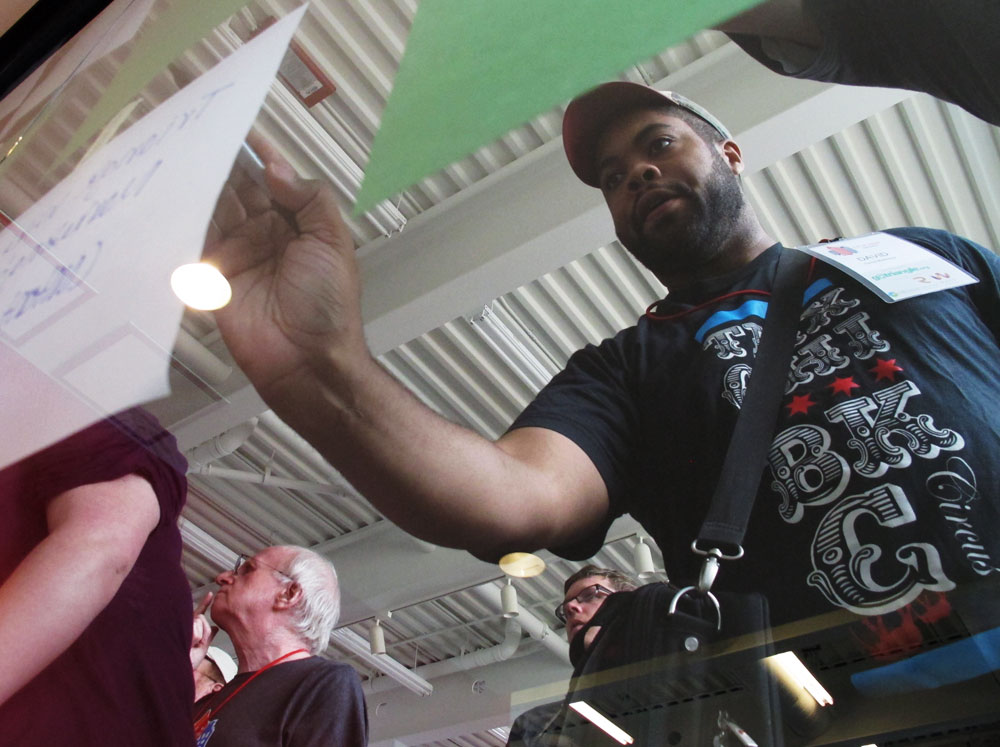
Lorena Akin (center), a master's student in architecture at N.C. State, reads session descriptions Saturday morning at CityCamp Raleigh before voting for her favorites. Photo by Tyler Dukes
Lorena Akin had 60 seconds.
In the short-term, the goal was simple: make a good impression on the dozens of Triangle locals gathered in the conference room in front of her. At the very least, that would probably earn her a spot on the nearby empty grid, which would soon map the agenda for the open government “unconference” CityCamp Raleigh.
This is how an unconference typically begins. No set schedules, just a wall of empty time slots. Attendees gather in the morning with their session pitches and decide what will make the cut.
But at this unconference, the sessions were an opportunity for something bigger — they were a chance to plant a seed. Session leaders could work with other attendees to refine ideas for open-government projects and crystalize a team. By Sunday afternoon, those teams would get a shot at $5,000 to turn their projects into reality.
Getting there, of course, all depended on how Akin used her 60 seconds. And how well her idea resonated with the crowd.
She posed a question: How many in the audience were frequent users of the Greenway?
Most hands shot up.
What citizens needed, she said, was a way to easily find information on the Greenway’s trails, like where to park and how to get from point to point.
Heads nodded, the audience applauded and Akin’s pitch joined dozens of others vying for 25 slots on the grid.
Less than 36 hours later, Akin and a team of six other campers took the top prize after cobbling together a working prototype of the RGreenway mobile app and a laundry list of upcoming features. Their idea beat out nine competing projects that used data supplied by the city and its citizens to tackle everything from capturing the history of Raleigh to providing exclusively local Web search.
“These people gave up a whole weekend to work on a project to make their community a better place,” Raleigh Mayor Nancy McFarlane, who attended the event, said. “It gives you a good perspective on how much data we have and how valuable it is as a resource.”
Making the connection
Making good use of that resource is what allowed the RGreenway team to move so quickly over the weekend. Their prototype mashes up the city’s own geographic data and issue reporting service with social sharing and mapping tools to make the Greenway easier to navigate.

David Matthews, a local graphic designer, votes for a session during the kickoff of CityCamp Raleigh Saturday morning. Photo by Tyler Dukes
“We all use the Greenway and we were all like, ‘Why isn’t this here?'” David Matthews, a RGreenway team member and self-employed graphic designer, said. “Everything’s already there. We just had to pull it together and make it look pretty.”
Although CityCamp organizer Jason Hibbets said the project may seem simple, it can be tough to make similar ideas a priority within the government. By using the agency’s own open data however, residents don’t need to wait for someone to do things for them.
“[Government officials] are aware of the problem, but they don’t have the resources to solve the problem,” Hibbets said. “Engaging citizens to find a solution is where the magic happens.”
The RGreenway team is hoping to use the prize money to clean up their prototype and add more features before its release, slated within the next few months. They even hope to someday make the technology accessible from kiosks for those who don’t have smartphones.
The end goal, says team member and Web developer Brad Johnson, is to use technology to make the Greenway “America’s smartest park.”
And for a city that spends a lot of taxpayer money to maintain the almost 4,000 acres of public trails, Akin said the app just makes sense.
“We are Raleigh,” Akin, a master’s student in architecture at N.C. State, said. “The Greenway is our thing.”
City council: 8 for 8
Hibbets said this won’t be the end for the other nine projects pitched to the judges. There may even be some additional funding available for the second-place project, Raleigh Retold, an application to help users create, share and view multimedia stories about Raleigh’s history based on their current location.
Over the course of the next year, Hibbets said the group behind CityCamp will continue to work to move open source and open government ideas forward with more education and more events — both online and in person.
It’s the same strategy he says explains why all eight Raleigh city councilors showed up to the event over the course of the weekend. Hibbets said their buy-in is important, especially given their unanimous support in February on a resolution to make the city’s information more accessible to the public.
“This wasn’t a political show-up,” Hibbets said. “It shows they are genuinely interested in this.”
